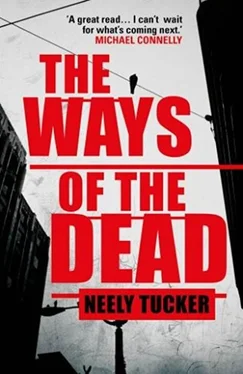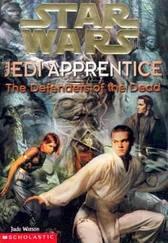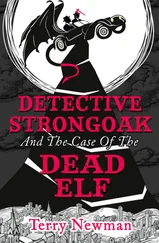The third figure, who started walking his way, was a woman. She passed under a streetlight, crossed the street, passed the cop in the cruiser, and pulled out her car keys. Sully smiled.
“Counselor,” he called out.
Eva turned, startled, but did not relax her shoulders when she recognized him. She crossed the street, walking to where he sat.
“Thought you guys dug out information. Not come to a crime scene and sit.”
“Odd for you to be out on a scene, isn’t it?” he said.
“No,” she said, a little too quickly. “We don’t always wait to get suspects to file indictments.”
“A grand jury original?”
“’s what they call it.”
“This’ll be your case.”
“It might, but you can’t print that. It’s not settled.” She turned and looked toward the alley. “They got more people down there than the state fair. FBI, Marshals, ATF. Surprised I didn’t run into LAPD.”
“Who are the guys in the store just before she died?”
“Listening to the BOLOs, are we? Three young men we want to talk to. We don’t have names, so don’t ask. There’ll be a bulletin in a few with a general description.”
“Are they suspects?”
“I believe the term is ‘persons of interest.’”
“So are they suspects?”
“If you were one of them, and half the local and federal police agencies in the nation’s capital were hunting your ass, what would you feel like?”
“Thought so. Where’s the girl? Sarah?”
“She was in a dumpster back there. She is at the morgue. I imagine they’ll be reflecting the scalp in a bit. You know what that is? Reflecting the scalp?”
“I’ve heard.”
“I’ve seen. It’s something that shouldn’t happen to fifteen-year-olds at dance class.”
“What happened to her in the alley?”
“Can’t say.”
“Can’t or won’t?”
“Either. Both. Pick.”
“Cause of death? Proximate cause of death? We got word this was a stabbing.”
“You’re looking for attribution or confirmation?”
“Either. Both. Pick.”
“No attribution to me or my office. But I will confirm, as a law enforcement official familiar with the investigation, the stabbing.”
“Multiple? Or a one-shot thing that hit an artery?”
“Usually when you cut someone’s throat you get the artery.”
“Multiple wounds or just the one?”
“Only one apparent.”
“Sex crime?”
“Sully. The parents. I’m not saying. Forensics will bear that out anyway, one way or the other.”
“Is there any evidence it’s targeted? Her being Reese’s kid?”
“Will neither confirm nor deny.”
“So what was her condition in the dumpster?”
“Wrapped in a big black trash bag, like the ones contractors use. But it’s not clear if she was wrapped in that by whoever killed her or by the uniform who found her.”
“I didn’t hear that right.”
“The cop who found her. Canvassing the alley-her mother was screaming and everybody knew who she was-officer looks in, sees a body, facedown. Jumps in and rolls her over to, I don’t know, try to save her. Then he sees the cut. She’d bled out onto this black trash bag that was under her. He pulled that back over her body, now that she was faceup, until other units got here.”
“That wasn’t good.”
“Hey, no shit. Now we don’t know if she was wrapped up before she got thrown in or if it was already there and she gets thrown in on top of it.”
“Ah.”
“And when I say thrown in, let me be clear. This is a tall, big, heavy dumpster, about five feet high. She was down inside there on top of a couple of feet of garbage.”
“Blood on the pavement outside the dumpster? Side of it?”
“Some.”
“A puddle, a lake, a drop?”
“More than the last, less than the middle.”
“Eva, for Christ’s sake.”
“It’s not clear if she was dragged there or killed on the spot if that’s what you’re asking.”
“Blood nearby?”
Sully saw her look down at him. The light was muted, from overhead. He could see the beginning of crow’s feet, the full lips, the strong, high cheekbones. It struck him, her age, and by extension, his.
“Scene is still being worked,” she said, finally.
“Alright.”
“You look like you’re half asleep,” she said.
“You look fried.”
“If I’m not, I’m going to be.” She nodded good night in parting, turned, and walked to her Jeep Cherokee. She pulled out and was gone.
Sully called Tony, affirming the manhunt for the three black men in the store and giving the details of the throat slashing. He was careful with the description of the blood’s amount and location, to make it less likely he’d get burned if Eva’s initial description was less than exact. He decided to omit the bit about the black garbage bag; it was just too complicated to get into.
Tony took the information and cut the line, no bullshitting this time.
He blew out his lips and cursed softly.
Eva was dripping out intel to her benefit, handing out the leak on the throat slashing like it was nothing, then holding back on the rest. Fine. Nothing personal. But his job, and his problem, was that he had to get ahead of her and the detectives and the federal agents swarming over this, putting their stamp of What Happened Here on it all.
Trusting the police-particularly as fucked up as D.C.’s-had never been on his list of smart things to do, and he wasn’t going to start now.
He limped up Princeton away from the crime scene, and slowly, as he thought, purpose came into his step. The pace picked up. He knew where he was going and what he was going to do. There was risk attached, yeah, but if he’d learned anything from eleven years in the worst hellholes on earth, it was that reporting without risk was an oxymoron.
The night was cooling by degrees and he was thinking maybe he should have kept the cycle jacket. A left turn on Warder, crossing Quebec-the neighborhood, Park View, row houses and semi-detached homes, had been an immigrant niche even before World War II. It had been Jews and Greeks and Italians then, waiters and carpenters and dockworkers and owners of shoe stores and merchants of hats and olives and corner markets.
Now the immigrants were Jamaicans and Hondurans and Ethiopians and Nicaraguans and Nigerians and Algerians and a handful of Lebanese, taxi drivers and custodians and hotel doormen and lawn maintenance workers. The founding generation of this black and brown group-here for twenty, thirty, forty years, keeping their lawns looking as if they were trimmed with scissors, the azaleas fertilized-were seventy years old and stuck living alongside the drug dealers and the prostitutes and the alcoholics, a slow-motion spiral of decline of the second and third generation.
He turned onto Rock Creek Church Road, passing three young men standing against the side of a house on a corner. They watched him walking and he watched them back and he nodded and they did not nod back. The trees were old and stout and cast great shadows beneath the streetlights. The yards were raised from the sidewalk, with low stone walls as borders, and the houses had porches populated by cheap folding chairs or old couches and lime-green outdoor carpeting.
At a house in the middle of the block, Sully opened the metal gate, rusting on its hinges. He limped up the five concrete steps, two of them with chipped and broken chunks, and onto the front porch. There was an overstuffed couch, with several rips and exposed stuffing, and a wooden swing with peeling paint. Before he reached through the security gate to knock on the door, he heard the dog growling inside.
The wooden door swung open on a dark hallway. The Rottweiler barked twice, his ears up and alert.
Читать дальше












